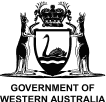Westport has partnered with the Western Australian Marine Science Institution (WAMSI) to deliver the $13.5 million WAMSI-Westport Marine Science Program. This 3-year program is developing the latest data, information and modelling on the complex environmental systems and community values associated with Cockburn Sound.
Project 2.2: Thermal priming of dehisced Posidonia seed does not increase thermal tolerance in establishing seedlings
Research theme: Benthic Habitats and Communities
Researchers: J Whale, N Dunham, A Bywater, D Field, E Sinclair, S Styrdom and K McMahon
Publication date: October 2024
Investigating whether thermal priming Posidonia seed increases heat tolerance in establishing seedlings
Temperate seagrasses, like those found in WA waters, are under threat from rising sea temperatures and climate change.
To understand how to better protect seagrass health, this study looked to see if priming seagrass seeds with higher water temperatures before being planted could improve the plants’ long-term resilience to higher temperatures and, therefore, be a way to improve the survival rate of seagrass into the future.
Posidonia australis seeds were collected from Woodman Point as part of the annual harvest conducted by the community-led seagrass restoration program, Seeds for Snapper.
The seeds were kept in a ‘natural’ environment until dehiscence when the seagrass fruit opens to release the seed. The released seeds were then put through a controlled experiment to see whether seeds exposed or primed to higher temperatures would have better resilience post-planting.
Around 256 seedlings, either primed or part of the control group, were studied for survival and growth over several weeks at either ambient (normal) temperatures or higher temperatures of 28 degrees, similar to that found during marine heatwave conditions.
The study found no improved resilience resulting from priming seeds with higher temperatures.
What the report found
- The yield of unprimed seedlings was higher than primed seedlings under a heatwave, not ambient conditions, suggesting unprimed seedlings performed better in marine heatwave conditions.
- Significantly fewer seedlings survived the elevated temperature treatment.
- Leaf growth and root development reduced under marine heatwave conditions, regardless of the priming pre-treatment, despite the method showing promise to build thermal tolerance in mature seagrass plants.
How Westport will use the report
While this report did not show effectiveness of thermal priming for seagrass seeds, it recommended other priming options be considered to improve seagrass health and outcomes. The report will inform Westport’s overall environmental management framework, including a commitment to significantly scale up seagrass restoration during port construction and operation.
You can read the full report here.





